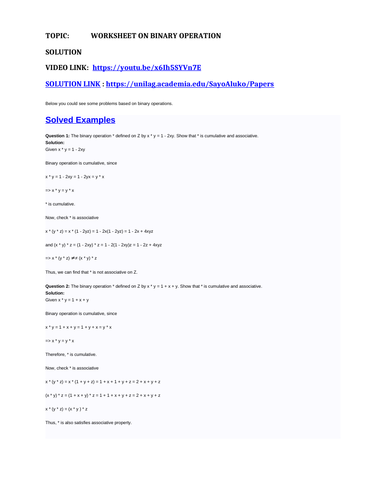

Below you could see some problems based on binary operations. Solved Examples Question 1: The binary operation * defined on Z by x * y = 1-2xy. Show that * is cumulative and associative. Solution: Given x * y = 1-2xy Binary operation is cumulative, since x * y = 1-2xy = 1-2yx = y * x => x * y = y * x * is cumulative. Now, check * is associative x * (y * z) = x * (1-2yz) = 1-2x(1-2yz) = 1-2x + 4xyz and (x * y) * z = (1-2xy) * z = 1-2(1-2xy)z = 1-2z + 4xyz => x * (y * z) ≠≠ (x * y) * z Thus, we can find that * is not associative on Z. Question 2: The binary operation * defined on Z by x * y = 1 + x + y. Show that * is cumulative and associative. Solution: Given x * y = 1 + x + y Binary operation is cumulative, since x * y = 1 + x + y = 1 + y + x = y * x => x * y = y * x Therefore, * is cumulative. Now, check * is associative x * (y * z) = x * (1 + y + z) = 1 + x + 1 + y + z = 2 + x + y + z (x * y) * z = (1 + x + y) * z = 1 + 1 + x + y + z = 2 + x + y + z x * (y * z) = (x * y) * z Thus, * is also satisfies associative property. A binary operation on a set is a calculation involving two elements of the set to produce another
Something went wrong, please try again later.
This resource hasn't been reviewed yet
To ensure quality for our reviews, only customers who have downloaded this resource can review it
Report this resourceto let us know if it violates our terms and conditions.
Our customer service team will review your report and will be in touch.